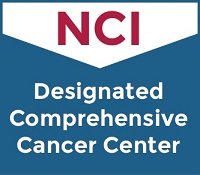Early Diagnosis and Treatment Saves the Life of Inflammatory Breast Cancer Patient
 Cancer survivor Sandra Smith was diagnosed at age 58 with inflammatory breast cancer, a
relatively rare but often deadly form of the disease. That was in 1996. Today,
she is a breast cancer survivor, once again healthy and active. Here,
the Stewartstown, Pennsylvania, resident talks about her experience with breast
cancer and her treatment experience in the Breast
Evaluation and Treatment Program at the University of Maryland Marlene and
Stewart Greenebaum Cancer Center.
Cancer survivor Sandra Smith was diagnosed at age 58 with inflammatory breast cancer, a
relatively rare but often deadly form of the disease. That was in 1996. Today,
she is a breast cancer survivor, once again healthy and active. Here,
the Stewartstown, Pennsylvania, resident talks about her experience with breast
cancer and her treatment experience in the Breast
Evaluation and Treatment Program at the University of Maryland Marlene and
Stewart Greenebaum Cancer Center.
What originally made you suspect that there might be a problem with your breast?
It was in August of 1996 and my husband and I were getting ready to go away for a weekend at the beach in Fenwick Island. I noticed a pink spot on one of my breasts and a patch of skin that looked inflamed, with an orange peel-like appearance. Earlier that same year, I had a case of cellulitis in my leg and foot that turned out to be very hard to treat, and so at first I thought that maybe this was the same thing starting up again. So I didn't waste any time getting an appointment with my doctor.
How was your cancer diagnosed?
I went to my family doctor first, but she didn't know much about this type of breast cancer. She's a surgeon, so she did a needle biopsy of the area, which showed that I did have cancer.
What was your reaction when you first heard the news?
We went to see an oncologist who was highly recommended. He reviewed all of my mammograms and the biopsy results. I remember being stunned by what he told me. He said that he only saw two or three cases like mine a year, that I had a very rare type of breast cancer, and that the survival rate was very poor -- about a year and half to three years. I was in total shock. I also decided right then and there that, no matter how good the doctor was, I wanted to be treated by someone with a better bedside manner.
How did you come to the University of Maryland cancer center?
The oncologist recommended that I consider treatment as part of a research study. I knew that the type of breast cancer that I had – inflammatory breast cancer – was aggressive and that I needed to begin treatment as soon as possible. So, after a complete battery of diagnostic tests, we made appointments at two different hospitals to explore the options. One doctor thought I should have a bone marrow transplant, which sort of scared me. Then I came and met with Dr. Tkaczuk [Katherine Tkaczuk, M.D., director of the Breast Evaluation Program and professor of Medicine at the University of Maryland Marlene and Stewart Greenebaum Cancer Center]. Right away, I knew I had found the place where I wanted to have my treatment. I felt a sense of caring and empathy with "Dr. Kate" immediately.
What form of treatment did you undergo?
First I had aggressive chemotherapy for two months. Then, on December 18, I had my surgery – a double mastectomy and several lymph nodes removed. Surgery was followed by more chemotherapy from February to June, and then radiation therapy for several more months.
Did you experience any side effects?
I took the chemotherapy treatments well. I was in treatment over the Thanksgiving holiday, and I remember that I temporarily lost my sense of taste. At one point, the drugs made my throat very raw and I had trouble eating, but I pulled through that.
I lost my hair from the chemo treatments. On the night before I went in for surgery, my daughter and grandkids were kidding around, and they put some of the children's temporary tattoos on my bald head. I can still remember the doctors and nurses laughing at my head covered in Christmas tattoos as I went into surgery.
What did you think of your doctors and the staff?
Dr. Tkaczuk is fabulous. I just love her. All the nurses and staff in the Breast Clinic are so warm and caring. They were all so nice to me and helped give me the confidence that I could get through the treatments, beat the cancer and be healthy again.
How are you doing now?
I feel great. For the first couple of years, I came back for checkups every three months. Now I come in every six months for follow up. I like to garden and do yard work — I prune my own trees — and I love to read and go out with friends. I was lucky to have my supportive family and friends and lots of prayers during my illness. My husband passed away in 2002, but I live close to my kids and their families.
What advice would you give to other women?
My cancer was diagnosed 10 years ago, and not many people seemed to know about inflammatory breast cancer at the time. Now here it is 10 years later, and a lot of people still don't know about it. We need to spread the word that this kind of breast cancer is serious, but it can be cured if you catch it early.




